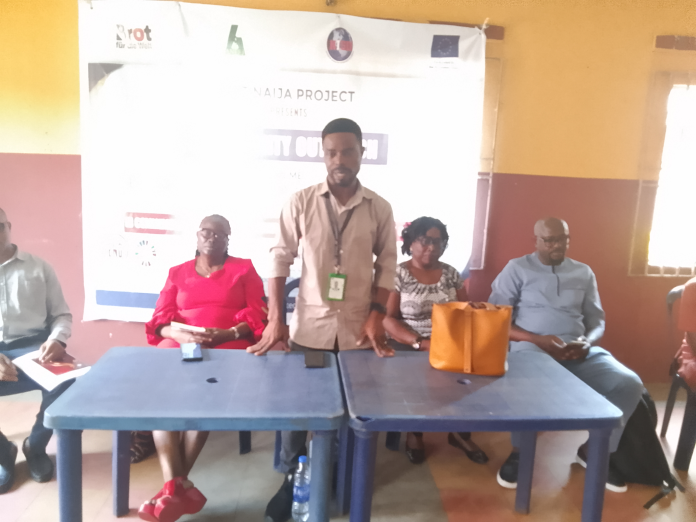By Lucy Ezeliora
Members of ActNaija has called on residents of Ubulu -Uku and Stakeholders to partake in the ongoing social protection intervention programmes taking place in every part of the state.
Speaking during a community outreach in Ubulu-Uku to commemorate the 2025 International Day for Poverty Eradication, the State Programme Officer of ActNaija, Mr Erhisohwode Assurance Ovie, said the Delta State Government, through various ministries, has implemented several social protection initiatives aimed at improving the quality of life for Deltans, especially the most vulnerable.
Mr Ovie explained that the government’s interventions focus on expanding access to education and healthcare, as well as promoting entrepreneurship through microfinance schemes and skills development programmes.
“Beyond engaging stakeholders to pursue appropriate policies and projects that bring relief to the people, the government also oversees the National Social Investment Programme Agency (NSIPA), which was revived by the Federal Government to effectively deliver social safety net interventions to vulnerable citizens,” he said.
He added that feedback from the outreach would help the government agencies identify and reach communities that genuinely need assistance. Ovie also called on residents to support Governor Sheriff Oborevwori’s social protection policies targeted at lifting millions of Deltans out of poverty.
According to him, the people also have a role to play by taking advantage of the available social programmes. He commended the Delta State Government for its deliberate and thoughtful interventions in supporting the poor, the vulnerable, and small businesses.
“Social protection is an investment in people,” Ovie stated. “It provides stability to households, improves access to healthcare, helps families build human capital, and gives them a chance at resilience. “Community members were called upon to take full advantage of ongoing interventions and support the government’s poverty alleviation drive so that more persons can become self-reliant and independent.”
He further emphasised the importance of continuous orientation on social protection programmes and pledged ActNaija’s commitment to work with partners in delivering on the project’s objectives.
Ovie commended the state government for using the State Social Register to anchor its interventions, describing it as an essential tool for ensuring transparency in social protection delivery.
“Poverty knows no political boundary,” he noted. “That’s why we involve traditional rulers, religious leaders, town unions, youth and women groups in the process, to ensure the interventions reach the right people.”
Beyond cash transfers, Ovie explained that the government is also investing in sustainable empowerment projects, including the construction of rural access roads to connect farming communities to markets. He praised key stakeholders such as the Ministry of Economic Planning, the Ministry of Women Affairs, and other advocates for their tireless work in promoting inclusiveness and poverty reduction.
In her remarks, Mrs Kate Agadaigho, Assistant Director at the Ministry of Economic Planning, reaffirmed that Governor Sheriff Oborevwori has directed that all social intervention programmes in Delta State must not be politicised.
She highlighted the administration’s multi-faceted approach to empowerment, listing initiatives such as the MORE Business Programme, Rural Youth Skills Acquisition (RYSA) Scheme, and the Widows Empowerment Programme as key interventions designed to ease economic pressure and provide sustainable livelihoods for disadvantaged groups.
Mrs Agadaigho encouraged Ubulu-Uku residents to take full advantage of ongoing social protection programmes in the state.
“When the income of the poor rises, the wealth of the nation rises as well,” she said. “Giving stipends to the vulnerable helps to grow the nation’s wealth.”
She described the cash transfer initiatives delivered through the social register as success stories with direct impact on vulnerable Deltans. She also noted that indigenous contractors are prioritised for related projects to stimulate local economies and create jobs.
However, Agadaigho cautioned against unproductive empowerment models, warning that indiscriminate cash handouts could worsen inflation and reduce productivity.
“Empowerment must be tied to productivity,” she emphasised “The Oborevwori administration ensures that every intervention adds value by supporting entrepreneurs and equipping new participants with relevant skills.”
Expressing optimism, she said the forum would not end as a mere “talk shop” but would result in practical strategies to strengthen the state’s social protection system and improve citizens’ well-being.
Agadaigho also stressed that shock-responsive benefit transfers delivered through digital platforms were essential for building public trust and long-term economic stability.
Some beneficiaries of the programme also expressed appreciation. Mrs Nneka Obi, a makeup trainee from Ubulu-Uku, thanked the government and ActNaija for their empowerment initiatives. She promised to establish her own business and employ others in the future.
Similarly, Mr John Anisha from Akwu Quarters, Ubulu-Uku, commended the organisers for their consistency in empowering the community through various cash and social protection programmes.


